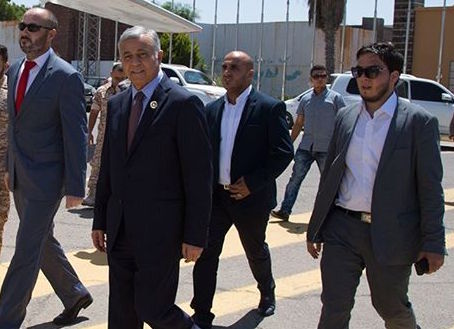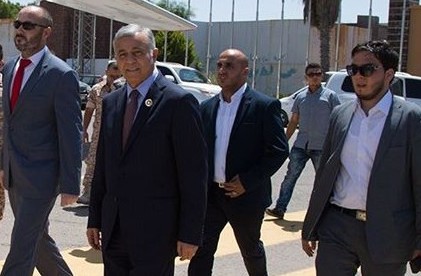By Libya Herald reporter.

Tunis, 31 July 2015:
UN Special Envoy Bernardino Leon has been meeting with continuing General National Congress (GNC) president . . .[restrict]Nuri Abu Sahmain in Algiers in a bid to get the GNC’s delegates to return to the Libya Dialogue negotiations in Skhirat, Morocco.
Both men started talks as soon as they arrived in the Algerian capital yesterday, Thursday. The talks continued today.
The GNC team at Skhirat walked out of the Dialogue negotiations at the end of June, rejecting the final Draft agreement presented by Leon. It reduced the role of the proposed State Council comprising largely of GNC members.
That Draft, under which the House of Representatives (HoR) would be Libya’s parliament for up to two years, has since been signed by all the other delegates and the Dialogue is now supposed to come up with names for a prime minister and two deputy premiers. However, the GNC continues to boycott the process. It has demanded that the Dialogue accept that it, not the HoR, is Libya’s legitimate parliament. This, however, is seen as merely a bargaining counter.
It is reported that its latest demands being put to Leon include the Dialogue declaring that a number of decisions by the HoR be cancelled. These include the appointment of Khalifa Hafter as commander-general of the Libyan armed forces and a defence cooperation agreement with Egypt.
Before heading to Algiers, Leon was in Zawia in an attempt to persuade it to back the Dialogue once more. The coastal town west of Tripoli is a firm supporter of Libya Dawn and the GNC although it has signed its own peace deal with Zintan.
In a statement released after the visit, clearly designed to curry favour with Libya Dawn and GNC as well as reach out to the revolutionaries in the west who are opposed to a return to Skhirat, Leon declared that the revolutionaries were “committed to preventing terrorism, extremism and the recurrence of authoritarian rule” and that agreement at Skhirat would enable them to join the armed and security forces or be integrated into civilian life. More controversially, he also added that he rejected “describing them as terrorist militias as this would not contribute to the solution of the Libyan crisis”. [/restrict]







